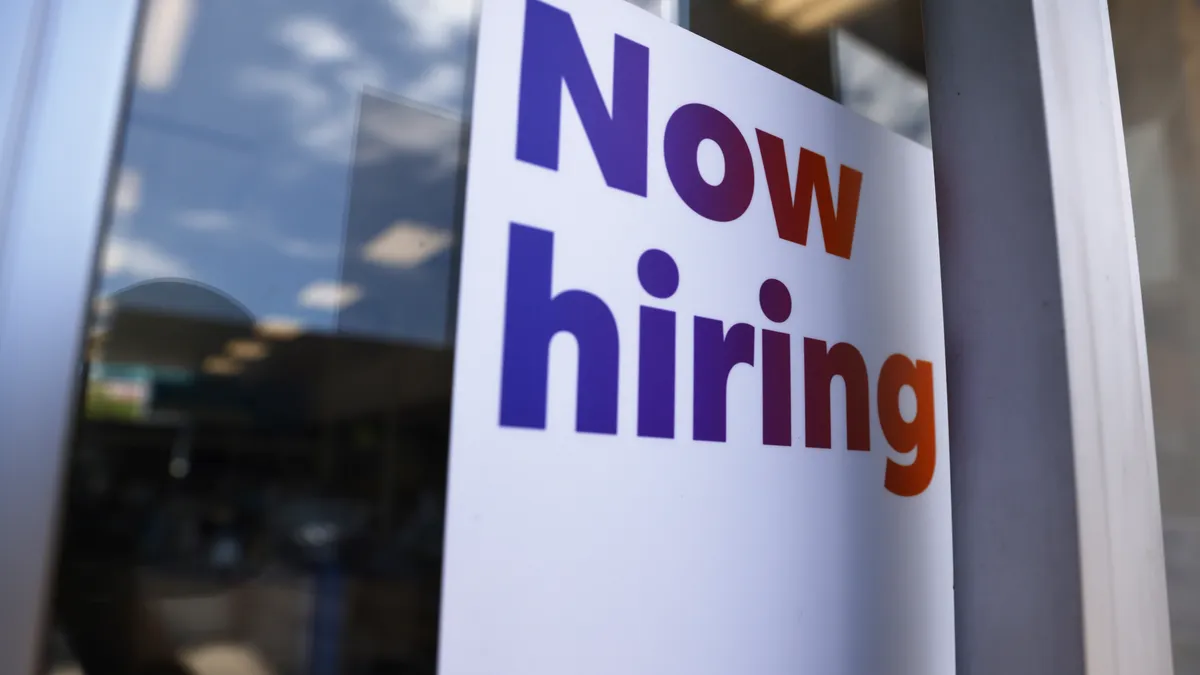Dive Brief:
- Private sector employment grew by 128,000 jobs from April to May, according to ADP, the lowest gain since the start of pandemic recovery, which could indicate companies across the board are still struggling to attract talent.
- Small businesses were once again the group reporting the toughest losses, seeing a reduction of 91,000 this month that follows an April decrease of 120,000 jobs for the group.
- “Under a backdrop of a tight labor market and elevated inflation, monthly job gains are closer to pre-pandemic levels,” Nela Richardson, chief economist for ADP, said in a press release. “The job growth rate of hiring has tempered across all industries, while small businesses remain a source of concern as they struggle to keep up with larger firms that have been booming as of late.”
Dive Insight:
The lower May numbers are a decline from the 202,000 jobs reported in April, revised from an initial report of 247,000 gains for the previous month. The month's job gains also fall well below the Dow Jones' forecast which estimated that 299,000 private payroll jobs would be added last month.
ADP figures were released ahead of Friday’s jobs report, for which current forecasts show private payrolls growing by 301,000 for May as reported by Bloomberg. ADP and the Bureau of Labor Statistics data have often diverged over the pandemic, but these lukewarm gains could potentially point to a slowing hiring recovery. Unemployment is currently forecast to dip to 3.5%, which would make it the lowest seen since December 1969, according to a recent CNBC report.
Small businesses with less than 50 employees experienced the highest jobs month to month jobs decline, according to the ADP report, reducing payroll by 91,000 jobs. Gains within the leisure and hospitality sector, meanwhile, came in at a modest 17,000 jobs for the month. Data released yesterday from the U.S. Bureau of Labor Statistics also found the number of job openings fell to 11.4 million by the end of April, with the rate of openings decreasing by 7%.
The report indicates companies may still face challenges when competing for talent in the labor market. However, higher labor participation reflected in the report could be a boon for the U.S. Federal Reserve, as this — combined with soaring prices as inflation continues to climb upwards — could also help to nudge Americans back into the workforce and curb wage growth. A “meaningful reduction” in wage growth will be critical to reducing inflation, former Treasury Secretary Lawrence Summers said on Tuesday. Failing to cap inflation or see a decrease in unemployment could see the U.S. economy headed toward yet another recession, Summers warned.
Reining in inflation is a top priority for the Federal Reserve, according to Fed Chair Jerome Powell, who met with President Joseph Biden Tuesday to discuss the issue. U.S. Treasury Secretary Janet Yellen admitted she was “wrong” about inflation in statements to CNN following the meeting. Yellen pointed to “unanticipated and large shocks to the economy” that pushed up energy and food prices that have badly affected the economy during the interview, stating a lack of full understanding of such factors previously.












